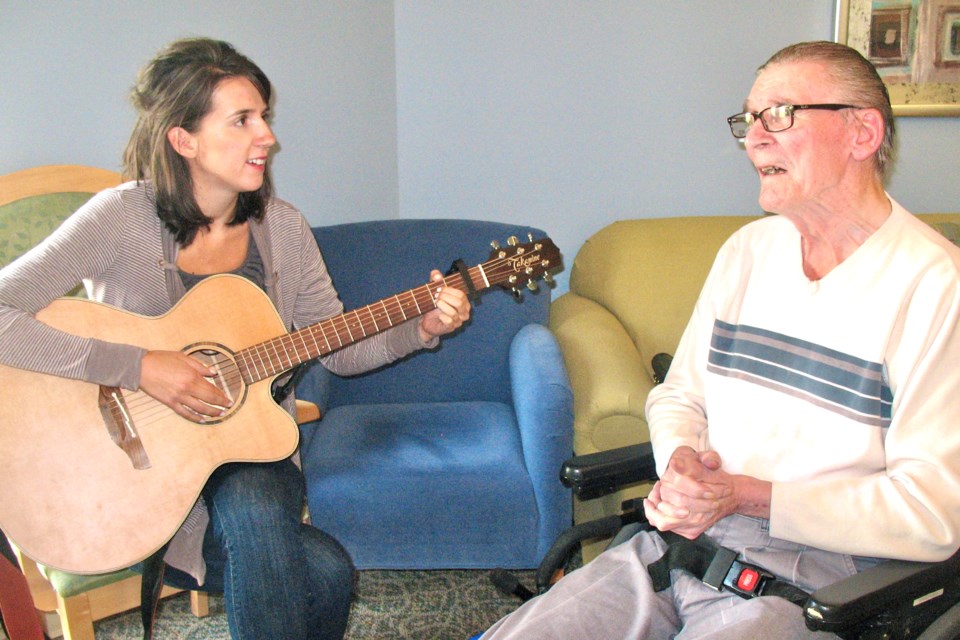Making a connection with the elderly can be a source of joy. But when you see them break through their isolation with the added dimension of music, it’s all the more rewarding.
“I’m deeply passionate about working with this population and value their stories and wisdom,” says Christine Fabian, a music therapist in Edmonton and owner of Solful Music Therapy who spends close to half her time with seniors. She knows the real benefit of music therapy is for her clients, who may be facing feelings of powerlessness, loneliness or depression.
Music therapy is the use of sound, music and rhythm to engage participants and improve their physical, emotional and spiritual well-being. While music therapy benefits children through adults, for seniors in particular it is a proven approach that pulls them out of their shell and breaks barriers to interacting with others.
Music that is familiar and meaningful to older people offers a basis for a trusting relationship with their therapist, says Fabian, who is trained in voice, piano, guitar and percussion.
While she offers her service to all ages, she also has expertise working with people challenged by Alzheimer’s or dementia.
“For older adults and those with Alzheimer’s and dementia, whose memories are compromised, music leads them to reflect on meaningful moments in their lives,” she explains. “It serves as the bridge to discussion and reminiscence.”
She notes a recent session she had with one gentleman who brightened up on hearing a favourite song.
“He began talking about his sweetheart – how they met, their children, their love that goes on and on – upon hearing the song 'Let Me Call You Sweetheart',” she recalls.
Research suggests that when people interact musically, oxytocin is released. This is the hormone responsible for bonding and enhancing feelings of trust. For Fabian, this therapeutic relationship is at the heart of her work.
“Developing that relationship serves to build and establish trust, an essential component when it comes to helping a client toward wellness and positive change,” she says.
A program in Calgary has taken the therapeutic power of music into the halls of seniors’ wards. Based on a 2017 pilot by the LINKages Society of Alberta, the Music 2 LINK program focuses on seniors’ care partners, who will be making regular visits to participating care centres and learning how to interact with their loved one with music, among other benefits.
The pilot itself was based on the 2014 documentary Alive Inside, which showcased the use of music as a foundation for unlocking dementia for residents of a care ward in the U.S.
In the Calgary pilot, 24 junior and senior high volunteers visited with 12 seniors for eight months. The students gathered information from their partnered senior to get a sense of music they would have listened to in younger days. A playlist was created and each senior was given an iPod with a personalized playlist.
LINKages staff saw smiles lighting seniors’ faces when they heard their favourite songs, and friendships develop. Elderly residents who were verbally able to communicate picked their own music, and some learned how to operate the iPods.
Music seems to have a powerful capacity to trigger the recollection of memories associated with that particular tune, says Crystal Guzman, a LINKages program coordinator.
“Music and art helps people with dementia orient themselves in the environment, into the present moment,” she explains.
The result includes less aggressiveness, more responsiveness and relief for a time from depression and internal isolation.
“This impact of music on emotions and memory can be observed in people of all ages and memory capacity,” notes Guzman. “But it has an astonishing effect on those with dementia and memory loss.”
She recalls her own grandmother, when she could no longer speak in coherent sentences.
“I and my family found that her favourite music was a magical tool to help us communicate feelings with her. She would smile, laugh, clap, and sing along to the songs.”
There are many rewards to using music as therapy, agrees Christine Fabian, but what she’s continually inspired by are the relationships that develop.
“To see these therapeutic musical experiences and their ability to foster connections and interactions, and bring individuals together ... is something that I love. I walk away with my bag of instruments, songbook, and guitar on my back and think, This is why I am a music therapist.”




